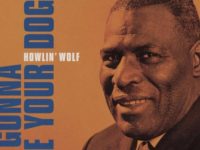 They are, these odds and ends, the last great treasure left by one Sam Maghett — better known as Magic Sam.
They are, these odds and ends, the last great treasure left by one Sam Maghett — better known as Magic Sam.
This god of the tremolo embodied (just as fully, but with far less fanfare) the same gritty and adventurous West Side Chicago swagger more commonly associated with Buddy Guy and Otis Rush. Yet, we have precious little to go by — other than his celebrated late 1950s recordings for Cobra (including “All Your Love,” “Eazy Baby” and “All My Whole Life,” they were made when Maghett was just 19) and then the superlative late ’60s long-players West Side Soul and Black Magic for Delmark a decade later.
Maghett spent the bulk of the period before his untimely, and shockingly early, demise from a heart attack at age 32, plying his trade at legendary Windy City spots like Sylvio’s Lounge, the Alex Club and Walton’s Corner. The Grenada, Miss., native developed a unique, pick-less style that stressed staccato improvisation and wave upon wave of ringing reverb — a free-form artistry that sprung from his early years of playing on crude country diddley-bows. Blistering, charismatic and jabbing on guitar, he also had a high-pitched, distinctive voice that curled around a lyric.
Still, Sam rarely recorded between 1958-67, since there was no market for that sound until the late-1960s roots revival carried him to the brink of superstardom. It made scraps eventually issued as The Late Great Magic Sam by the tiny L+R label (and later reissued by Evidence) lost blues treasures of the highest order.
Four tracks done in October 1963 marked Maghett’s first sessions since his breakthrough more than five years before. He recorded in a quartet format, with Johnny “Big Moose” Walker on organ, Mack Thompson on bass and Bob Richey on drums. They ran through Maghett’s “Baby, You Torture My Soul,” “Sometimes” and a rough and rattling take on “All Your Fault,” along with Junior Parker’s “Feelin’ Good.”
Legendary producer/bassist/composer Willie Dixon then oversaw a February 1964 date that featured “Hi-Heel Sneakers” (with a searing solo turn at the organ by the returning Walker), a new recording of Sam’s “All Your Love,” “Trying to Make It,” “Call Me If You Need Me” (Shakey Jack Harris’s 1958 hit with this cut actually included Maghett on guitar), “Back Door Friend” (famously done 1952 by Jimmy Rogers for Chess) and “Look Out Sam.”
If you can find them, they are another critical element in understanding how the Chicago sound was constructed.
The German CBS label issued this version of “Hi-Heel Sneakers,” backed with “All Your Love,” but it only belatedly saw stateside release. There were a scant handful of tracks made on Chief Records in 1960-61 (the highlight was an effective adaptation of Fats Domino’s “Every Night About This Time”) and during a sideman date with saxman Eddie Shaw (which included the wailing “That’s Why I’m Crying”) five years later. Otherwise, that was it. Maghett’s catalog was as girder-shaking as it was abbreviated.
Evidence’s mid-1990s compilation also included two cuts — lively versions of Sam’s “Eazy Baby” and “Looking Good” — from a triumphal, post-West Side Soul date in October 1969 at the Royal Albert Hall, featuring Thompson on bass with Robert St. Julien on drums.
Maghett, reportedly set to sign with the legendary Stax Records after so long without a label, was dead just two months later.
- How Deep Cuts on ‘Music From Big Pink’ Underscore the Band’s Triumph - July 31, 2023
- How ‘Islands’ Signaled the Sad End of the Band’s Five-Man Edition - March 15, 2022
- The Band’s ‘Christmas Must Be Tonight’ Remains an Unjustly Overlooked Holiday Classic - December 25, 2016



